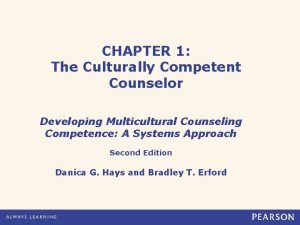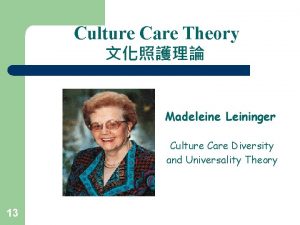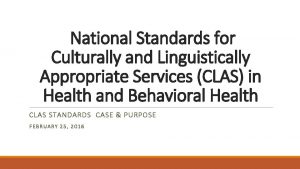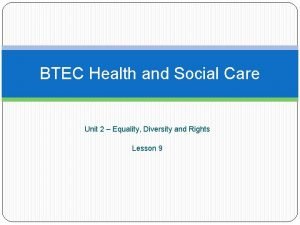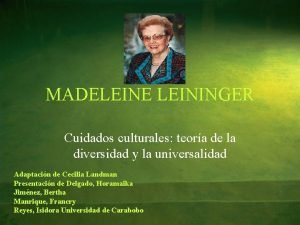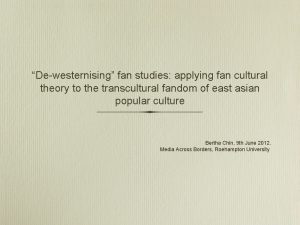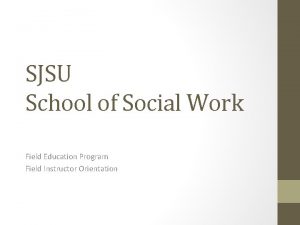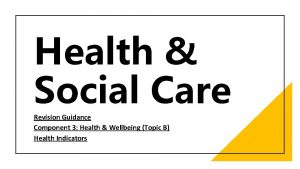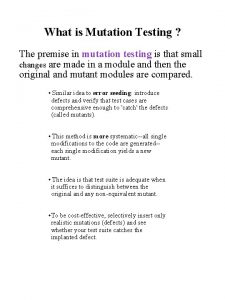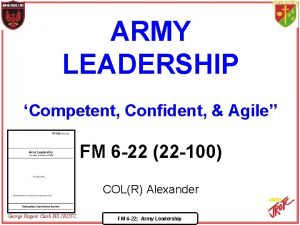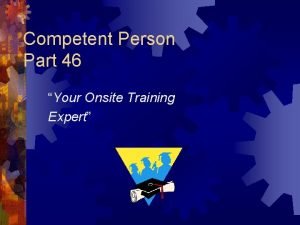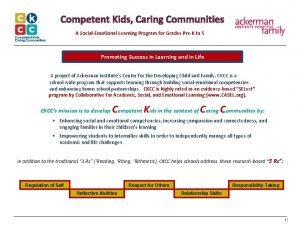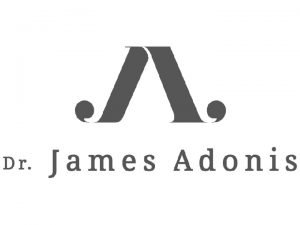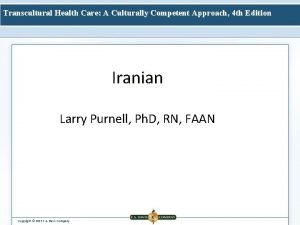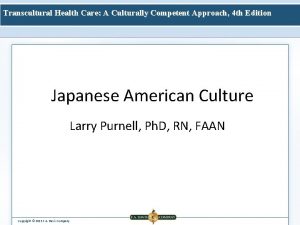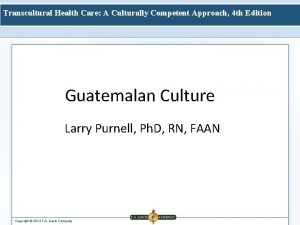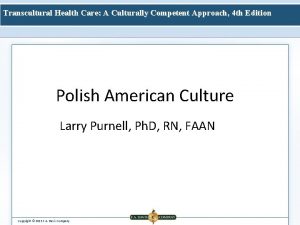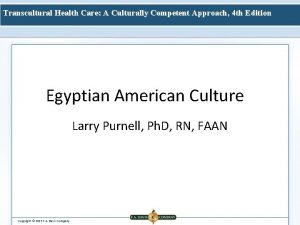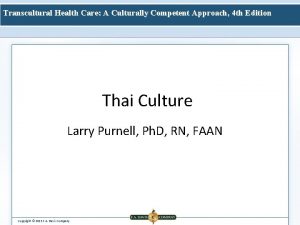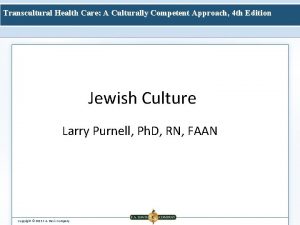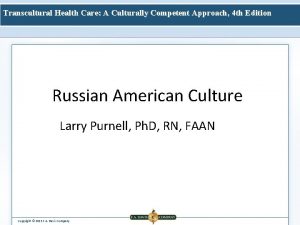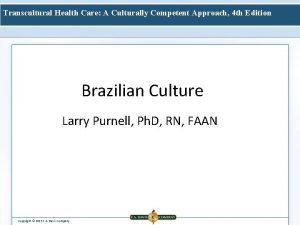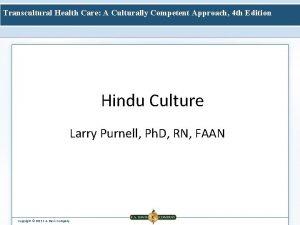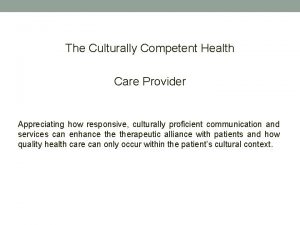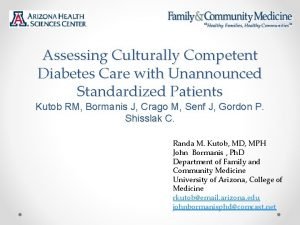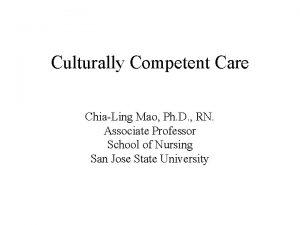Transcultural Health Care A Culturally Competent Approach 4















































- Slides: 47

Transcultural Health Care: A Culturally Competent Approach, 4 th Edition Arab American Culture Larry Purnell, Ph. D, RN, FAAN Copyright © 2013 F. A. Davis Company

Transcultural Health Care: A Culturally Competent Approach, 4 th Edition Arab Overview/Heritage § Arabs, coming from 22 countries, are united by a common language, Arabic. § No U. S. census category for Arabs; they are absorbed into the White category. § Most earlier Arab immigrants in the late 1880 s to 1913 were Christians, educated, and settled in the Northeastern United States Copyright © 2013 F. A. Davis Company

Transcultural Health Care: A Culturally Competent Approach, 4 th Edition Arab Overview/Heritage § Post-1965, Arabs in the US were Muslims, highly educated and professional or immigrated for higher education. § Arabism, Muslim, and Islam are intricately interwoven and share basic traditions and beliefs. Copyright © 2013 F. A. Davis Company

Transcultural Health Care: A Culturally Competent Approach, 4 th Edition Arab Communication § Arabic is the official language of the Arab world. § English is a common second language among Arabs throughout the world. § Communication is highly contextual. § Conversants stand close and maintain rather intense eye contact.

Transcultural Health Care: A Culturally Competent Approach, 4 th Edition Arab Communication § For traditional Arabs, touch is only accepted between members of the same sex. § Speech is generally loud and expressive with repetition and gesturing. § Privacy is valued so sharing outside the immediately family is not common. § Etiquette requires handshaking upon arrival and departure but only between same sex individuals. Copyright © 2013 F. A. Davis Company

Transcultural Health Care: A Culturally Competent Approach, 4 th Edition Arab Communication § Titles are important and are used in combination with the person’s first name as in Mr. Ali. § Punctuality is not always valued except in cases of professional or business meetings. § Explain the importance of timeliness in healthcare appointments. Copyright © 2013 F. A. Davis Company

Transcultural Health Care: A Culturally Competent Approach, 4 th Edition Arab Family Roles and Organization § Traditional Arab families are highly patrilineal. § In public, a wife’s interactions with her husband is formal and respectful. At home, the woman may have tremendous influence in matters pertaining to the home and children. § Gender roles are clearly defined: men are decision-makers, protectors, and breadwinners.

Transcultural Health Care: A Culturally Competent Approach, 4 th Edition Arab Family Roles and Organization § The authority structure and division of labor within Arab families are often misinterpreted, fueling common stereotypes of the overtly dominant male and the passive and oppressed woman. § Children are dearly loved, indulged, and included in all family activities.

Transcultural Health Care: A Culturally Competent Approach, 4 th Edition Arab Family Roles and Organization § Children are dearly loved, indulged, and included in all family activities. § Children are raised not to question elders and to be obedient to older brothers and sisters. Discipline may include physical punishment and shaming. § Adolescents are pressed to succeed academically.

Transcultural Health Care: A Culturally Competent Approach, 4 th Edition Arab Family Roles and Organization § • Adolescents are pressed to succeed academically. § Academic failure, sexual activity, illicit drug use, and juvenile delinquency bring shame to the family. For girls in particular, chastity and decency are required. § Family members live nearby and sometimes intermarry with first cousins.

Transcultural Health Care: A Culturally Competent Approach, 4 th Edition Arab Family Roles and Organization § Devout Muslim women value modesty. § Many Muslim women view the hijab, “covering the body except for one’s face and hands, ” as offering them protection in situations in which the sexes mix. It is a recognized symbol of Muslim identity and good moral character. § Many Americans associate the hijab with oppression rather than protection.

Transcultural Health Care: A Culturally Competent Approach, 4 th Edition Arab Family Roles and Organization § Sons are held responsible for supporting elderly parents. § Elderly parents are almost always cared for within the home. § Homosexuality is usually highly stigmatized. In some Arab countries, it is considered a crime, and participants may be killed.

Transcultural Health Care: A Culturally Competent Approach, 4 th Edition Arab Workforce Issues § Discrimination such as intimidation, being treated suspiciously, and negative comments about their religious practices have been reported as a major source of stress among Arab Americans. § Muslim Arabs who wish to attend Friday prayer services and observe religious holidays may encounter job-related conflicts.

Transcultural Health Care: A Culturally Competent Approach, 4 th Edition Arab Workforce Issues § Impassioned communication may incorrectly be assumed that Arabs are argumentative, confrontational, or aggressive. § Criticism is often taken personally as an affront to dignity and family honor. § Whereas such direct praise may be somewhat embarrassing for Americans, Arabs expect and want praise when they feel they have earned it.

Transcultural Health Care: A Culturally Competent Approach, 4 th Edition Arab Biocultural Ecology § Most Arabs have dark or olive-colored skin, but some have blonde or auburn hair, blue eyes, and fair complexions. § Infectious diseases such as tuberculosis, malaria, trachoma, typhus, hepatitis, typhoid fever, dysentery, and parasitic infestations are common with newer immigrants.

Transcultural Health Care: A Culturally Competent Approach, 4 th Edition Arab Biocultural Ecology § Glucose-6 -phosphate dehydrogenase deficiency, sickle cell anemia, and the thalassemias are extremely common in the eastern Mediterranean. § High consanguinity rates (roughly 30 percent of marriages in Iraq, Jordan, Kuwait, and Saudi Arabia) occur between first cousins and contribute to the prevalence of genetically determined disorders in Arab countries.

Transcultural Health Care: A Culturally Competent Approach, 4 th Edition Arab Biocultural Ecology § Some Arabs have difficulty metabolizing debrisoquine, antiarrhythmics, antidepressants, beta blockers, neuroleptics, and opioid agents.

Transcultural Health Care: A Culturally Competent Approach, 4 th Edition Arab High-Risk Health Behaviors § Smoking and nonuse of seat belts and helmets are major issues among Arabs in the US. § Some Arab women may be at high risk for domestic violence, especially new immigrants, because of the high rates of stress, poverty, poor spiritual and social support, and isolation from family members.

Transcultural Health Care: A Culturally Competent Approach, 4 th Edition Arab High-Risk Health Behaviors § Sedentary lifestyle and high fat intake among Arab Americans place them at higher risk for cardiovascular diseases. § The rates of breast cancer screening, mammography, and cervical Pap smears among Arab Americans are low because of modesty.

Transcultural Health Care: A Culturally Competent Approach, 4 th Edition Arab Nutrition § Spices and herbs include cinnamon, allspice, cloves, ginger, cumin, mint, parsley, bay leaves, garlic, and onions. § Skewer cooking and slow simmering are typical modes of preparation. All countries have rice and wheat dishes, stuffed vegetables, nut-filled pastries, and fritters soaked in syrup.

Transcultural Health Care: A Culturally Competent Approach, 4 th Edition Arab Nutrition § Consumption of blood is forbidden; Muslims are required to cook meats and poultry until well done. Some Muslims refuse to eat meat that is not halal (slaughtered in an Islamic manner). § Muslims are prohibited from eating pork and pork products which includes ingredients mouthwashes, toothpastes, alcohol-based syrups and elixirs, and gelatin coated capsules. However, if no substitutes are available, Muslims are permitted to use these preparations.

Transcultural Health Care: A Culturally Competent Approach, 4 th Edition Arab Nutrition § Grains and legumes are often substituted for meats; fresh fruit and juices are especially popular, and olive oil is widely used. § Food is eaten with the right hand because it is regarded as clean. § Eating and drinking at the same time is viewed as unhealthy.

Transcultural Health Care: A Culturally Competent Approach, 4 th Edition Arab Nutrition § During Ramadan, the Muslim month of fasting, abstinence from eating, drinking (including water), smoking, and marital intercourse during daylight hours is required. § Although the sick are not required to fast, many pious Muslims insist on fasting while hospitalized. § Lactose intolerance is common among Arab Americans.

Transcultural Health Care: A Culturally Competent Approach, 4 th Edition Arab Pregnancy and Childbearing Practices § Fertility practices are influenced by traditional Bedouin values, which support tribal dominance and beliefs that “God decides family size. ” § Procreation is regarded as the purpose of marriage; high fertility rates are favored. § Sterility in a woman can lead to rejection and divorce.

Transcultural Health Care: A Culturally Competent Approach, 4 th Edition Arab Pregnancy and Childbearing Practices § Many reversible forms of birth control are undesirable but not forbidden. They should be used when there is a threat to the mother’s life, too frequent childbearing, risk of transmitting a genetic disease, or financial hardship. § Irreversible forms of birth control such as vasectomy and tubal ligation are “absolutely unlawful” as is abortion, except when the mother’s health is compromised by a pregnancy-induced disease or her life is threatened.

Transcultural Health Care: A Culturally Competent Approach, 4 th Edition Arab Pregnancy and Childbearing Practices § Unwanted pregnancies are dealt with by hoping for a miscarriage, “by an act of God”, or by covertly arranging for an abortion. § The pregnant woman is indulged and her cravings satisfied, lest she develop a birthmark in the shape of the particular food she craves. § Although pregnant women are excused from fasting during Ramadan, some Muslim women may be determined to fast.

Transcultural Health Care: A Culturally Competent Approach, 4 th Edition Arab Pregnancy and Childbearing Practices § Labor and delivery are women’s affairs. § During labor, women openly express pain through facial expressions, verbalizations, and body movements. § Care for the infant includes wrapping the stomach at birth, or as soon as possible thereafter, to prevent cold or wind from entering the baby’s body.

Transcultural Health Care: A Culturally Competent Approach, 4 th Edition Arab Pregnancy and Childbearing Practices § The call to prayer is recited in the Muslim newborn’s ear. § Male offspring are preferred. § Male circumcision is almost a universal practice, and for Muslims it is a religious requirement. § Mothers may be reluctant to bathe postpartum because of beliefs that air gets into the mother and causes illness.

Transcultural Health Care: A Culturally Competent Approach, 4 th Edition Arab Pregnancy and Childbearing Practices § Many believe washing the breasts “thins the milk. ” Breast-feeding is often delayed until the second or third day after birth because of beliefs that the mother requires rest, that nursing at birth causes “colic” pain for the mother, and that “colostrum makes the baby dumb. ” § Postpartum care foods, such as lentil soup, are offered to increase milk production.

Transcultural Health Care: A Culturally Competent Approach, 4 th Edition Arab Death Rituals § Death is accepted as God’s will. Muslim death rituals include turning the patient’s bed to face the holy city of Mecca and reading from the Qur’an, particularly verses stressing hope and acceptance. § After death, the deceased is washed three times by a Muslim of the same sex. The body is then wrapped, preferably in white material, and buried as soon as possible in a brick or cement-lined grave facing Mecca.

Transcultural Health Care: A Culturally Competent Approach, 4 th Edition Arab Death Rituals § Prayers for the deceased are recited at home, at the mosque, or at the cemetery. § Women do not ordinarily attend the burial unless the deceased is a close relative or husband. Instead, they gather at the deceased’s home and read the Qur’an. § For women, wearing black is considered appropriate for the entire period of mourning.

Transcultural Health Care: A Culturally Competent Approach, 4 th Edition Arab Death Rituals § Cremation is not practiced. § Autopsy is generally not approved because of respect for the dead and feelings that the body should not be mutilated. § Islam does allow forensic autopsies and autopsies medical research and instruction. § Organ donation and transplantation as well as administration of blood and blood products are acceptable.

Transcultural Health Care: A Culturally Competent Approach, 4 th Edition Arab Spirituality § Islam is the official religion of most Arab countries, and in Islam there is no separation of church and state; a certain amount of religious participation is obligatory. § Islam has no priesthood. Islamic scholars or religious sheikhs, the most learned individuals in an Islamic community, assume the role of imam, or “leader of the prayer. ” The imam acts as a spiritual counselor.

Transcultural Health Care: A Culturally Competent Approach, 4 th Edition Arab Spirituality The 5 major pillars or duties of Islam are § Faith, shown by the proclamation of the Unity of God by saying “There is no God but Allah; Mohammed is the Messenger of Allah. ” § • Prayer, facing Mecca, is performed at dawn, noon, midafternoon, sunset, and nightfall. § • Almsgiving to assist the poor and to support religious organizations. § • Fasting fulfills religious obligations, wipes out previous sins, and demonstrates appreciate the hunger of the poor. § • A pilgrimage to Mecca (hadj) once in a lifetime is encouraged if the means are available.

Transcultural Health Care: A Culturally Competent Approach, 4 th Edition Arab Spirituality § School and work schedules revolve around Islamic holidays and weekly prayer. Because Muslims gather for communal prayer on Friday afternoons, the work week runs from Saturday through Thursday. § Devout patients may request that their chair or bed be turned to face Mecca and that a basin of water be provided for ritual washing or ablution before praying.

Transcultural Health Care: A Culturally Competent Approach, 4 th Edition Arab Spirituality § Providing for cleanliness is particularly important because the Muslim’s prayer is not acceptable unless the body, clothing, and place of prayer are clean. § Sometimes illness is considered punishment for one’s sins.

Transcultural Health Care: A Culturally Competent Approach, 4 th Edition Arab Health-care Practices § Good health is considered the ability to fulfill one’s roles. § Diseases are attributed to an inadequate diet, shifts of hot and cold, exposure of one’s stomach during sleep, emotional or spiritual distress, and envy or the “evil eye. ” § Informed consent, self-care, advance directives, and preventive care valued.

Transcultural Health Care: A Culturally Competent Approach, 4 th Edition Arab Health-care Practices § Women are often reluctant to seek care because of cultural emphasis placed on modesty. § Many fear that a diagnosed illness, such as cancer or psychiatric illness, may bring shame and influence their marriageability. § Family members indulge the individual and assume the ill person’s responsibilities.

Transcultural Health Care: A Culturally Competent Approach, 4 th Edition Arab Health-care Practices § Communicating a grave diagnosis is often viewed as cruel and tactless because it deprives clients of hope. § Most expect physicians to select treatments. The client’s role is to cooperate. § Beautiful women, healthy-looking babies, and the rich are believed to be particularly susceptible to the evil eye. Thus, expressions of congratulations may be interpreted as envy.

Transcultural Health Care: A Culturally Competent Approach, 4 th Edition Arab Health-care Practices § Protection from the evil eye is afforded by wearing amulets, such as blue beads, or figures involving the number five; reciting the Qur’an; or invoking the name of Allah.

Transcultural Health Care: A Culturally Competent Approach, 4 th Edition Arab Health-care Practices § Mental or emotional illnesses may be attributed to possession by evil jinn. § Islamic medicine is based on theory of four humors and the spiritual and physical remedies prescribed by the Prophet. Because illness is viewed as an imbalance between the humors—black bile, blood, phlegm, and yellow bile—and the primary attributes of dryness, heat, cold, and moisture, therapy involves treating with the disease’s opposite: thus, a hot disease requires a cold remedy.

Transcultural Health Care: A Culturally Competent Approach, 4 th Edition Arab Health-care Practices § Although methods such as cupping, cautery, and phlebotomy may be used, treatment with special prayers or simple foods such as dates, honey, salt, and olive oil is preferred. § Preoperative instructions are thought to cause needless anxiety, hypochondriasis, and complications.

Transcultural Health Care: A Culturally Competent Approach, 4 th Edition Arab Health-care Practices § The tendency of Arabs to be more expressive with their family and more restrained in the presence of health professionals may lead to conflicting perceptions regarding the adequacy of pain relief. § Mental illness is a major social stigma. Psychiatric symptoms may be denied or attributed to “bad nerves” or evil spirits.

Transcultural Health Care: A Culturally Competent Approach, 4 th Edition Arab Health-care Practices § When individuals suffering from mental distress seek medical care, they are likely to present with a variety of vague complaints, such as abdominal pain, lassitude, anorexia, and shortness of breath. § Patients often expect and may insist on somatic treatment, at least “vitamins and tonics. ” § When mental illness is accepted as a diagnosis, treatment with medications, rather than counseling, is preferred. § Hospitalization is resisted because such placement is viewed as abandonment.

Transcultural Health Care: A Culturally Competent Approach, 4 th Edition Arab Health-care Practices § Because of social stigma, the disabled are often kept from public view. § Medical treatments that require surgery, removal of causative agents, or eradication by intravenous treatments are valued more than therapies aimed at health promotion or disease prevention.

Transcultural Health Care: A Culturally Competent Approach, 4 th Edition Arab Health-care Practitioners § Many Arabs find interacting with a health-care professional of the opposite sex quite embarrassing and stressful. § Discomfort may be expressed by refusal to discuss personal information and by a reluctance to disrobe for physical assessments and hygiene. § Women may refuse to be seen by male health care providers.

Transcultural Health Care: A Culturally Competent Approach, 4 th Edition Arab Health-care Practitioners § Knowledge held by a doctor is thought to convey authority and power. § Most clients who lack English communication skills prefer an Arabic-speaking physician. § The authority of physicians is seldom challenged or questioned. When treatment is successful, the physician’s skill is recognized; adverse outcomes are attributed to God’s will.
 Culturally responsive vs culturally relevant
Culturally responsive vs culturally relevant Culturally competent counselor
Culturally competent counselor Transcultural health care definition
Transcultural health care definition Transcultural health care definition
Transcultural health care definition Campinha-bacote
Campinha-bacote Sunrise model of madeleine leininger’s theory
Sunrise model of madeleine leininger’s theory Multifaceted approach to health care
Multifaceted approach to health care Comprehensive primary health care definition
Comprehensive primary health care definition Primary care secondary care tertiary care
Primary care secondary care tertiary care Cultural deprivation
Cultural deprivation Vdoe culturally responsive teaching
Vdoe culturally responsive teaching Culturally responsive teaching and the brain slides
Culturally responsive teaching and the brain slides Culturally responsive teaching in music education
Culturally responsive teaching in music education Classroom
Classroom Culturally responsive teaching self assessment
Culturally responsive teaching self assessment Culturally appropriate intervention strategies
Culturally appropriate intervention strategies Working with culturally and linguistically diverse families
Working with culturally and linguistically diverse families Pedagogy meaning
Pedagogy meaning National culturally and linguistically appropriate services
National culturally and linguistically appropriate services Health and social care values unit 2
Health and social care values unit 2 Madeleine leininger's sunrise model
Madeleine leininger's sunrise model Madeleine m leininger teoria
Madeleine m leininger teoria Towards a theory of transcultural fandom
Towards a theory of transcultural fandom Transcultural nursing questions
Transcultural nursing questions Theoretical foundations of transcultural nursing
Theoretical foundations of transcultural nursing Patricia enciso
Patricia enciso Social work sjsu
Social work sjsu Health and social care component 3
Health and social care component 3 Vacant word formation
Vacant word formation Competent supervision meaning
Competent supervision meaning Competent person's reporting
Competent person's reporting Cimah regulation 1996
Cimah regulation 1996 Interculturally competent
Interculturally competent What makes a competent communicator
What makes a competent communicator Competent authority
Competent authority Characteristics of a competent communicator
Characteristics of a competent communicator Competent authority
Competent authority Overlook synonym
Overlook synonym Competent programmer hypothesis
Competent programmer hypothesis Rama at sita
Rama at sita Types of scaffolding ppt
Types of scaffolding ppt Army leadership styles 6-22
Army leadership styles 6-22 The highly capable individual
The highly capable individual Competent intercultural communicators resist ambiguity.
Competent intercultural communicators resist ambiguity. Havisten competent
Havisten competent Define competent person
Define competent person Competent kids, caring communities
Competent kids, caring communities Lovable fool
Lovable fool

